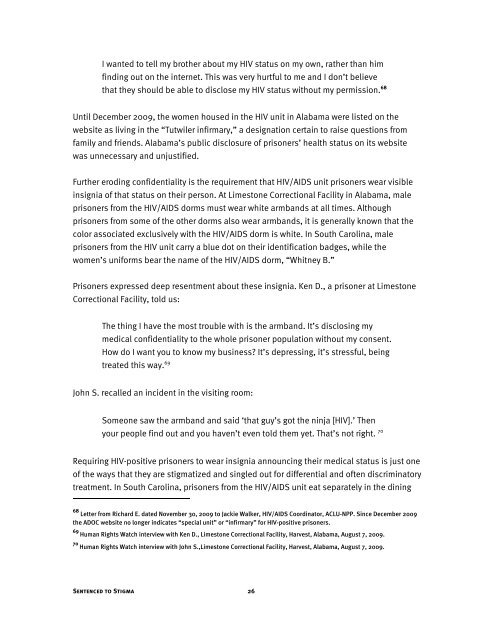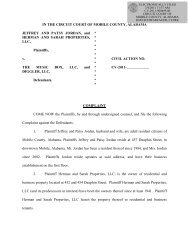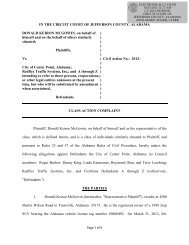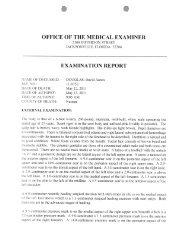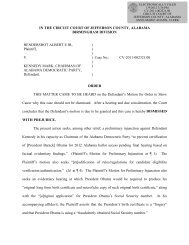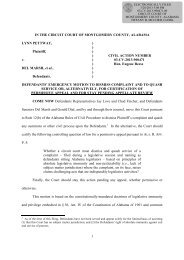Sentenced to Stigma: Segregation of HIV-Positive Prisoners - AL.com
Sentenced to Stigma: Segregation of HIV-Positive Prisoners - AL.com
Sentenced to Stigma: Segregation of HIV-Positive Prisoners - AL.com
Create successful ePaper yourself
Turn your PDF publications into a flip-book with our unique Google optimized e-Paper software.
I wanted <strong>to</strong> tell my brother about my <strong>HIV</strong> status on my own, rather than himfinding out on the internet. This was very hurtful <strong>to</strong> me and I don’t believethat they should be able <strong>to</strong> disclose my <strong>HIV</strong> status without my permission. 68Until December 2009, the women housed in the <strong>HIV</strong> unit in Alabama were listed on thewebsite as living in the “Tutwiler infirmary,” a designation certain <strong>to</strong> raise questions fromfamily and friends. Alabama’s public disclosure <strong>of</strong> prisoners’ health status on its websitewas unnecessary and unjustified.Further eroding confidentiality is the requirement that <strong>HIV</strong>/AIDS unit prisoners wear visibleinsignia <strong>of</strong> that status on their person. At Limes<strong>to</strong>ne Correctional Facility in Alabama, maleprisoners from the <strong>HIV</strong>/AIDS dorms must wear white armbands at all times. Althoughprisoners from some <strong>of</strong> the other dorms also wear armbands, it is generally known that thecolor associated exclusively with the <strong>HIV</strong>/AIDS dorm is white. In South Carolina, maleprisoners from the <strong>HIV</strong> unit carry a blue dot on their identification badges, while thewomen’s uniforms bear the name <strong>of</strong> the <strong>HIV</strong>/AIDS dorm, “Whitney B.”<strong>Prisoners</strong> expressed deep resentment about these insignia. Ken D., a prisoner at Limes<strong>to</strong>neCorrectional Facility, <strong>to</strong>ld us:The thing I have the most trouble with is the armband. It’s disclosing mymedical confidentiality <strong>to</strong> the whole prisoner population without my consent.How do I want you <strong>to</strong> know my business? It’s depressing, it’s stressful, beingtreated this way. 69John S. recalled an incident in the visiting room:Someone saw the armband and said ‘that guy’s got the ninja [<strong>HIV</strong>].’ Thenyour people find out and you haven’t even <strong>to</strong>ld them yet. That’s not right. 70Requiring <strong>HIV</strong>-positive prisoners <strong>to</strong> wear insignia announcing their medical status is just one<strong>of</strong> the ways that they are stigmatized and singled out for differential and <strong>of</strong>ten discrimina<strong>to</strong>rytreatment. In South Carolina, prisoners from the <strong>HIV</strong>/AIDS unit eat separately in the dining68 Letter from Richard E. dated November 30, 2009 <strong>to</strong> Jackie Walker, <strong>HIV</strong>/AIDS Coordina<strong>to</strong>r, ACLU-NPP. Since December 2009the ADOC website no longer indicates “special unit” or “infirmary” for <strong>HIV</strong>-positive prisoners.69 Human Rights Watch interview with Ken D., Limes<strong>to</strong>ne Correctional Facility, Harvest, Alabama, August 7, 2009.70 Human Rights Watch interview with John S.,Limes<strong>to</strong>ne Correctional Facility, Harvest, Alabama, August 7, 2009.<strong>Sentenced</strong> <strong>to</strong> <strong>Stigma</strong> 26


